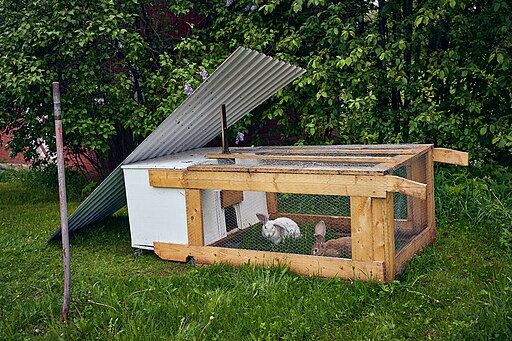Everyone loves bunnies! But unfortunately, these smart little animals are often bought on a whim. Many people do not realize that taking care of a bunny is a big responsibility. They do not prepare properly to have this new companion. Once the novelty wears off, many bunnies are often neglected. Rabbits are the 3rd most abandoned and welcomed animal in shelters each year(just after cats and dogs).
Traders usually buy 4-week-old rabbits for their pet stores because they require less space and are “cuter”. These babies are so young that many of them are not yet ready to be weaned from their mothers. People who buy them are often surprised when their little “pet” grows. The average weight of an adult rabbit varies between 2 and 20 LBS! Many unprepared guardians don’t realize how much space adult rabbits need to move and play. Rabbits can also live for more than 10 years, and being left in a cage is not “life” for them.
Rabbit Abandonment
Many people get bored of their bunnies once the initial excitement has passed. Rabbits are extremely sociable animals, but many are ignored. Although they require company to develop well (like cats and dogs!) It is common to see rabbits completely isolated in cages. If left alone, they can become withdrawn and depressed.
After their impulsive purchase, many owners regret and abandon their bunnies in animal shelters. Some people even release them outside! Rabbits that are abandoned abroad are often run over by cars, die of disease and inclement weather, are at risk of being attacked by predators and have little chance of long-term survival.
Some people believe that bunnies can live outdoors, so they enclose animals in outdoor rabbit hutches, where they are forced to endure all kinds of extreme weather. Rabbits cannot tolerate extreme heat or cold well, which can mean a life of misery and even death. Bunnies can become hypothermic when left outside in the cold. And since they can’t pant or sweat, temperatures above 75 degrees can be extremely dangerous to them. They are also at risk of contracting parasitic diseases that can be fatal.
 Caged Rabbits by Muzammil
Caged Rabbits by Muzammil
Symptoms
The symptoms below are not necessarily the result of neglect, but indicate that a bunny should see a vet: a runny nose, sneezing, head tilt, listlessness, and diarrhea are symptoms of a sick bunny. When you see a bunny, pay attention to these symptoms and inform their keeper about them immediately.
Rabbits have extremely delicate respiratory and digestive systems, and any change in the balance of these systems can result in death if the animal is not treated promptly and properly. Gastrointestinal stasis is a common, silent, and fatal disease. Lack of appetite is the most common symptom.
Any hairless or crusted area on the body indicates that the rabbit has parasites or has been fighting with other rabbits.
Rabbits can be paralyzed or have a head tilt, requiring treatment. Also, pay attention to injured limbs. If the keeper of a sick bunny refuses to get help for the animal, please contact animal control.
Rabbits are not cute toys to buy on impulse. They are complex and intelligent animals, capable of experiencing deep emotions, and they deserve the same consideration that you would give to a dog or cat. Buying rabbits at pet stores supports the idea that animals are “products” and they are not.
 Rabbits in a cage by Øyvind Holmstad
Rabbits in a cage by Øyvind Holmstad
Never buy a rabbit at a pet store or hatchery. If you DECIDE to adopt one (after long and careful consideration), be sure to do the following:
- Adopt at your local animal shelter.
- Find a vet who is familiar with rabbits and take your bunny for annual exams.
- Give your bunny as much love and attention as you would a dog or cat. Keep it indoors and treat the bunny rabbit as a member of the family, not locked in a cage or a rabbit hutch outside.
- Make sure to sterilize your bunny. Like cats and dogs, bunnies live longer, happier lives when they are spayed. For rabbits, the risk of reproductive cancer (which is fatal) is a whopping 80% before being spayed.
- Give your bunny lots of toys. Some suggestions include pieces of untreated wood, straw, cat wire balls, paper towel rolls, hard plastic baby toys, and even cardboard boxes.
- Organize a large box or a basket filled with confetti for your new partner to dig through.
- Provide your bunny with a safe and quiet haven where he can rest.
- Be sure to install rabbit guards in your house, or your partner could bite furniture, electrical cables, books, etc.
- Brush your bunny at least once a week.
- Unlike cats, rabbits do not have the ability to vomit, so it is important to provide them with enough hay, which helps prevent furballs.
- Rabbits require a diet consisting primarily of unlimited hay and a variety of fresh vegetables, supplemented with high-quality rabbit grains. They must also have access to clean water at all times.
![istockphoto-1157145588-170667a[1] Rabbit in Cage](https://i0.wp.com/cyclopetia.com/wp-content/uploads/2020/06/istockphoto-1157145588-170667a1.jpg?resize=509%2C339&ssl=1)





